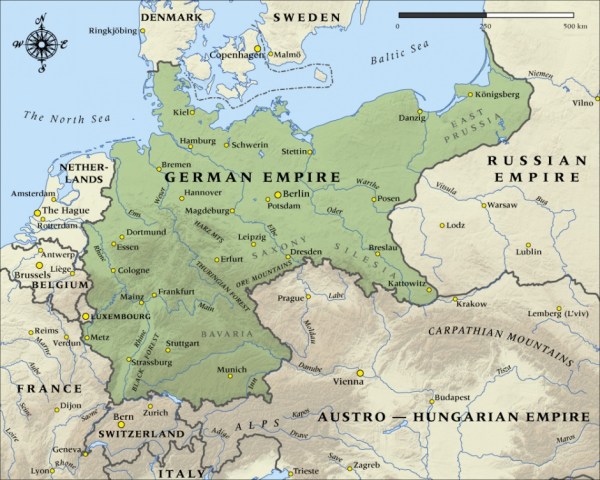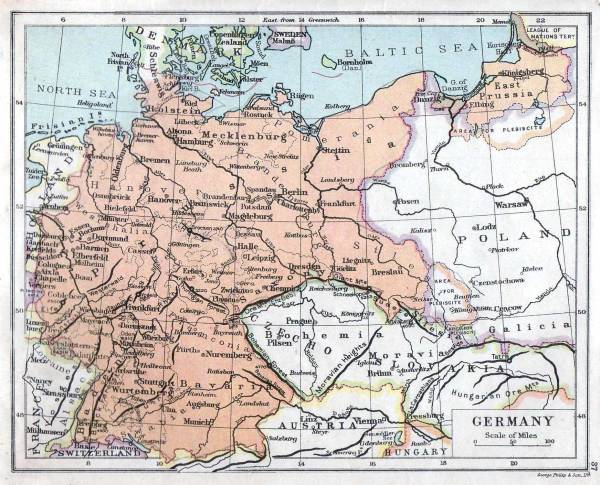Brief Historical Background
Ernst Klopp in the Wartheland ( 1940 – 1945)
The partitions of Poland and Lithuania were three partitions of the Polish-Lithuanian Commonwealth that took place toward the end of the 18th century and ended the existence of the state, resulting in the elimination of sovereign Poland and Lithuania for 123 years. The partitions were conducted by the Habsburg Monarchy, the Kingdom of Prussia, and the Russian Empire, which divided up the Commonwealth lands among themselves progressively in the process of territorial seizures and annexations.

My readers may remember that my grandmother Emma Klopp had settled in Elsenau, West Prussia not many years after her husband Peter Friedrich Klopp has died in 1900. Due to the provisions of the Treaty of Versailles, in 1920 she had to move west together with thousands of other dispossessed Germans. Also the area further south around the city of Posen (today Poznan) had to be returned to the newly created Polish State. That particular region was known as the Warthegau during the Nazi era and was named after the River Warthe. It was here in the area near Dietfurt (Znin) that my father Ernst Klopp received his assignment as director of three abandoned farms.

On 1 September 1939, without a formal declaration of war, Nazi Germany invaded Poland, using the pretext of the Gleiwitz incident, a provocation (one of many) staged by the Germans, who claimed that Polish troops attacked a post along the German-Polish border. During the following days and weeks the technically, logistically and numerically superior German forces rapidly advanced into the Polish territory. Secured by the Molotov–Ribbentrop Pact, the Soviet troops also invaded Poland on 17 September 1939. Before the end of the month, most of Poland was divided between the Germans and the Soviets.
War is always a form of insanity. But perhaps World War II was truly the most insane of all—not for those fighting the Nazis—that was truly justificable. But from the perspective of starting a war, this one had not even one tiny speck of justification other than evil and greed and a thirst for world domination. Thanks for the background, Peter.
LikeLiked by 1 person
The saddest part was that the Nazi policies were driven by an insane ideology that considered Eastern nations as racially inferior.
LikeLiked by 1 person
And Jews and blacks and gay people and gypsies and those with mental challenges or mental health issues or dwarfs and so on….
LikeLike
This is the message I got when trying to read your most recent post, Amy: “This is somewhat embarrassing, isn’t it?
It seems we can’t find what you’re looking for. Perhaps searching, or one of the links below, can help.”
I wonder what went wrong.
LikeLiked by 1 person
Read the next post—my apology. That post was a mistake. I somehow clicked on Publish when I dozed off at my laptop!
LikeLike
It’s wonderful you know all share all this history, Peter
LikeLiked by 1 person
We all have different things to offer to each other. That makes blogging so exciting.
LikeLiked by 1 person
You are so right, Peter❤️
LikeLiked by 1 person
Hallo Peter, wieder etwas interessantes von deiner Familiengeschichte dazu gelernt. LG Wolfgang
LikeLiked by 1 person
Thanks for the history lesson, Peter!
LikeLiked by 1 person
Yes, the Versailles treaty was heavy on the German people. Many think that it was the cause for the easy rise of the Nazis. They promised to make Germany “great again”.
LikeLiked by 1 person
Trump promises to make America strong again. It sounds frighteningly similar.
LikeLiked by 1 person
Yes it does, although Trump seems to say anything that makes people vote for him, while actually he his only interested in his personal financial profit.
LikeLike
Thank you Peter, for sharing another piece of your family and German history, the two maps explain it very well.
LikeLiked by 1 person
I can’t imagine how hard it must have been to live during those times! I wonder if people thought that Nazi rule was going to last forever? And thanks for including the maps…those help a lot to understand the geography.
LikeLiked by 1 person
This is all very familiar because just yesterday we watched several hours of programs in the television series “Titans of the 20th Century”: https://shop.pbs.org/WC5712.html
Now Communist China seems to have inherited the role that Nazi Germany played in the 20th century.
LikeLiked by 1 person
All these splits in the course of history made no sense, since everything was lost pretty soon.
LikeLiked by 1 person
What a chequered history the region has 😦 The other person’s real estate remains one of the most prized possessions, for individuals as well as for governments and empires.
LikeLiked by 1 person
Now that Germany and Poland belong to the EU it is hopefully the end of shifting ownership of land and territory.
LikeLiked by 1 person